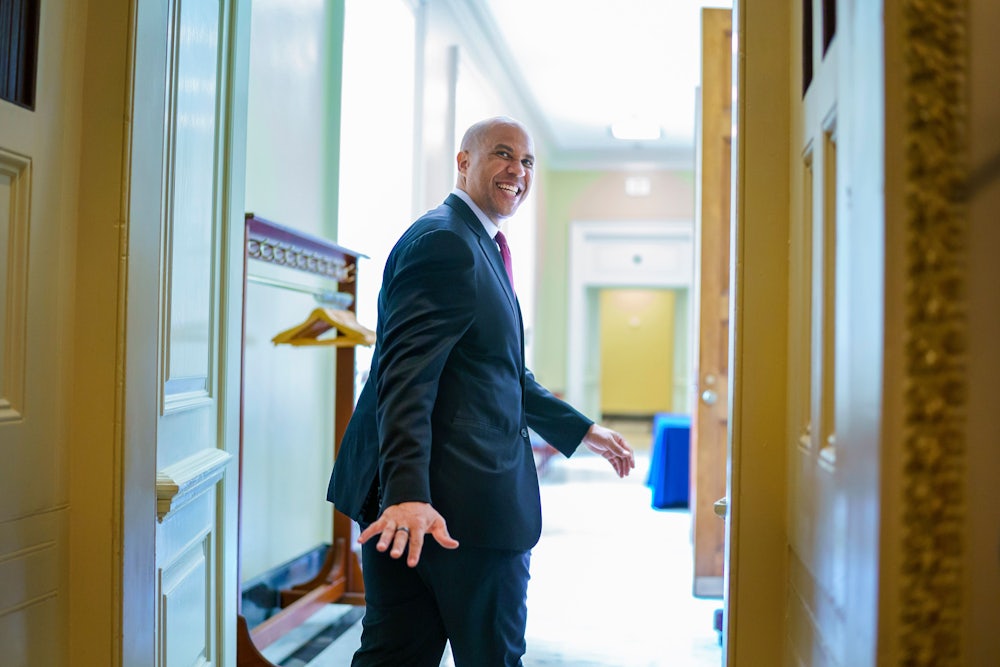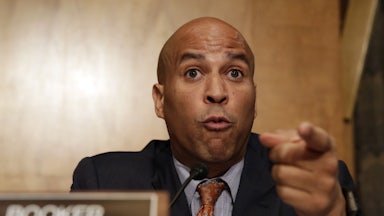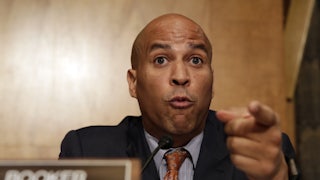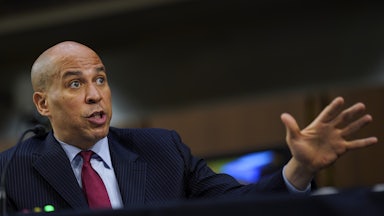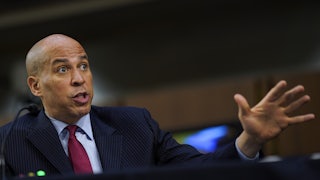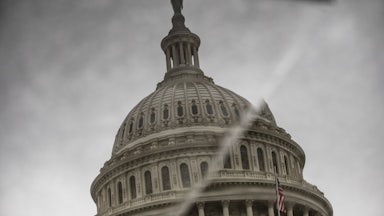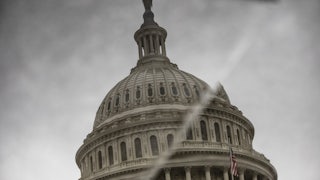Anyone who speaks with Senator Cory Booker for more than 30 seconds can’t help but come to one conclusion: The man is an abiding optimist. In an increasingly rancorous Congress, the junior senator from New Jersey maintains a theory of governance focused on building coalitions and bridging divisions through interpersonal connections. It’s a vision that formed the backbone of his ultimately unsuccessful presidential campaign, and it continues to define how he approaches his work in the Senate, even as the chamber struggles to perform its basic functions in a competent way.
“If we can’t figure out a way to really substantively, in our civic spaces, evolve out of this descension into the quicksand of tribalism, then this country is going to have a hard time getting back to the high ground of global leadership,” Booker told me, in a quote indicative of his mindset (and conversation style).
If the personal is political, for Booker, then the political is personal, as well. He remains convinced that the power of individual relationships can overcome the stickiest political logjams. Booker will speak at length of his friendship with Republicans such as Senators Jim Inhofe, Roger Wicker, and Chuck Grassley, the latter of whom is an ally in his crusade to reform food policy.
“I’m going to continue to try to build those coalitions, because—this was my presidential campaign—I really don’t believe we are as divided in this country as political leaders are trying to tell us we are,” Booker told me. “And I really think that there’s so much more common ground that could result in great policy.”
The Senate is, in theory, still the cooling saucer of Congress. It does remain more staid than the hot-tempered House; but many of the current firestorms in Congress are due to conditions in the evenly divided Senate. Democrats are seeking to pass massive legislation containing a laundry list of agenda items through the complicated and arduous process of reconciliation, which allows certain kinds of legislation to be approved with a simple majority. But the bill must receive buy-in from all 50 Democratic senators, and there are still two holdouts—Senators Joe Manchin and Kyrsten Sinema—who must be placated.
Sinema has not publicly offered her conditions for supporting a reconciliation bill, but Manchin has insisted that his top line for the bill would be $1.5 trillion—significantly less than the $3.5 trillion laid out by Democrats in August, to say nothing of the $6 trillion initially sought by progressives in Congress.
But while other congressional Democrats have issued implicit or explicit criticisms of the moderate Democrat from West Virginia, Booker expressed his gratitude for Manchin’s presence in the Senate. “Thank God for Joe Manchin,” Booker said. “I say that simply because if Joe Manchin wasn’t there, there would be a Republican there.” (Former President Donald Trump won the state by 41 percentage points in 2016 and 39 percentage points in 2020.)
Booker noted that Manchin has consistently voted in line with the rest of the caucus, including on the American Rescue Plan, the $1.9 trillion coronavirus relief measure that Congress passed via reconciliation in March. That bill included one of Booker’s key priorities, an expansion of the child tax credit. (In fact, Manchin has voted in line with President Joe Biden’s priorities 100 percent of the time thus far, according to FiveThirtyEight.)
“I don’t agree with Joe where he is right now, but … let’s be careful how we vilify each other, because in less than four years, there could be a Republican representing that state,” Booker said. Manchin won a second term in 2018 and will face reelection in 2024, if he decides to run again.
Manchin has been outspoken about his concerns over extending the expanded child tax credit. The West Virginia senator has suggested adding work requirements or further means testing to the program—it already determines eligibility by income—if it is to be continued. He told HuffPost this week that he thinks programs should be targeted to the “working poor,” which he defines as Americans making $50,000 or less, although he did not say whether he would want that to be the ultimate threshold for the child tax credit. Booker said that he was talking to Manchin about the child tax credit, although he declined to offer details about the substance of those discussions.
“Perhaps the biggest priority I have right now in my life is to expand the child tax credit, push it as far as we can, I’m hoping 2025 at least,” Booker said. Although he believes it should be extended indefinitely, he said he had “not heard any indication from leadership here, or the White House, that we can make it permanent.” But if Democrats are able to extend it for a certain time period and keep the key provisions of the expanded credit—namely, making it accessible to the lowest-income Americans and disbursing it on a monthly basis—then he believes it would be very difficult for a Republican Congress or president to let it lapse.
His instinct against speaking ill of his colleagues crosses party lines. Booker remains convinced that strong bipartisan relationships can be parlayed into legislative action. For example, maybe there is no middle ground between Republicans and Democrats on abortion rights, but Booker believes there could be some agreement on helping poor mothers and their children. While he and other Democrats will continue to fight to codify Roe v. Wade into federal law, he believes that lawmakers may yet be able to “find common ground to empower women.”
“If I can cut through all the distrust and demonization and actually have a heart-to-heart conversation with somebody—if you can accomplish that, there’s room to grow,” he said.
But conversations, no matter how well meaning or how lengthy, do not always translate to legislative action. Booker and Republican Senator Tim Scott spearheaded bipartisan negotiations to craft police reform legislation that would receive a sufficient number of Republican votes, a necessity in an evenly divided Senate. But after months of negotiation, the talks fell apart, after Scott rejected a proposal by Booker and Representative Karen Bass. Scott maintained that the proposal would have effectively defunded the police. However, a statement by two key police unions involved in the discussions denied that defunding the police had ever been on the table—and asserted that the proposal would have actually provided additional money to police departments.
Negotiators remained at a stalemate over issues such as qualified immunity for police officers and had tried to reach a deal on a less comprehensive bill, but even that proved too difficult. As part of this slimmed-down proposal, Democrats had hoped to codify an executive order by Trump that conditioned grants to police departments on whether they had received accreditation certifying that they met certain training standards. But Scott argued that, under the Democrats’ proposal, police departments couldn’t even be eligible for two grants unless they complied with the reforms.
Booker nevertheless insists that he and Scott remain friends and that the talks didn’t fail due to a “trust deficit” but rather “because of philosophical differences.” He also said that enthusiasm for the measure among Republicans, which once bolstered hopes that an agreement was possible, had dimmed substantially.
“We are definitely staring at a challenge right now where the momentum, I think, on the Republican side, or a desire to get it done, has been fading,” Booker said. “[Scott’s] enthusiasm for doing a bill was not necessarily matched by all his colleagues.”
In a statement to The New Republic, a spokeswoman for Scott said that he was willing to continue negotiations: “Senator Scott’s relationship with Senator Booker has allowed them to make great progress toward finding common ground on a number of issues that would make meaningful changes to our system of policing. That’s why he remains at the negotiating table and is hopeful his Democrat counterparts will return so they can deliver for the American people.”
Despite the impasse and the dissolution of talks, Booker said that the willingness of police unions to engage in negotiations was proof that the number of interested stakeholders was increasing, demonstrating that “when your coalition grows in a bipartisan way, it’s a really good sign that something can get done.”
“As much as I’m disappointed that we don’t have a bill, the reality is the pathway to the impasse was far more fruitful than I ever imagined,” Booker said, explaining that negotiations had given him opportunities to build relationships with the Fraternal Order of Police and the International Association of Chiefs of Police.
It’s still possible that some police reform legislation could pass in this Congress, but given the power of the filibuster, such prospects remain elusive at best. Booker has advocated for the elimination of the filibuster, a move that would allow the Senate to advance legislation with a simple majority instead of a 60-vote threshold and, potentially, encourage more discussions and negotiations across party lines. Booker contends that “forcing a bill in a bipartisan way sometimes is really good”—citing the example of the First Step Act, a bipartisan criminal justice reform legislation that passed during the Trump administration.
Booker’s optimism is not clouded by some misunderstanding of political realities. He said he was “going to continue to work to try to get the filibuster overcome” but was “realistic” about the prospect, given Manchin’s outspoken opposition to ending it. (Booker also said that he was “realistic” about the chances of including his legislation on baby bonds in the final reconciliation bill and noted the bipartisan origins of the policy, which would create an automatic savings account for every child.)
But while he is ready and willing to weigh in on the big issues of the day—and will indeed provide extremely lengthy answers—he will also chug along on issues that seem less likely to garner the notice of the national media, such as food and agricultural policy. He joined the Agriculture Committee earlier this year, believing the committee’s work touches “everything from racial justice to economic justice to workers’ rights to farmers to our ecology and environmental justice to climate change.” Booker recently introduced legislation to crack down on monopolies in the food industry and put a moratorium on large factory farms.
“The food system is absolutely broken and designed now to benefit multibillion-dollar multinational corporations. So it’s going to be fun. We’re going to try to do everything we can to blow the whistle and point out commonsense solutions,” Booker said.
Food policy is also, he is quick to note, an area where bipartisan action by “weird coalitions” is possible. He described a recent conversation about Grassley’s bill to reform transparency in cattle markets, a perhaps somewhat surreal experience for the former mayor of Newark. “If you had told me I would be in the Senate talking to Chuck Grassley about cattle policy,” Booker trailed off, laughing.
Cattle policy is one thing. But other, more immediate issues—say, suspending the debt ceiling—are quite another. He does have some stern words for the “rank hypocrisy” of Republicans who filibustered a suspension of the debt limit. (Democrats agreed to a deal proposed by Senate Minority Leader Mitch McConnell this week to temporarily extend the debt limit through December at least.) Regardless of whatever close personal relationships exist across the aisle, Senate Republicans are holding firm in their refusal to suspend the debt limit for the long term. “If you love a person, tell the truth, so I’m telling the truth,” Booker said. “Some of these shenanigans I just have little patience for.”
That unwillingness to help Democrats pass any aspect of their agenda extends beyond the debt ceiling (and is politically understandable, given the even division of the Senate and the likelihood of Republicans regaining Congress next year). Some of Democrats’ biggest priorities that cannot pass through reconciliation are likely to die in the Senate as long as the filibuster is in place—gun control legislation, for example, or immigration reform, or a measure enshrining legal protections for LGBTQ Americans, or the bill that would codify the right to an abortion, or key voting rights legislation.
The Senate will consider two voting rights bills in the coming weeks, a pared-down compromise bill called the Freedom to Vote Act and the John Lewis Voting Rights Advancement Act, which would restore a key provision of the 1965 Voting Rights Act struck down by the Supreme Court in 2013. However, neither is likely to garner the requisite 10 Republican votes to advance in the Senate. These bills come as Republican-led states across the country have considered or enacted a slew of bills restricting voting rights.
When asked about how the Senate could pass voting rights legislation with the filibuster in place, Booker argued that voting rights could be included in reconciliation. (This would require overruling the opinion of the parliamentarian, to which Manchin would almost certainly not agree.) But he also highlighted the importance of working with Republicans, a diplomatic commitment to bipartisanship one might expect from Manchin himself.
“We are working under the assumption—on bills from food policy to economic policy—we’re working on the assumption, we’ve got to find ways to get a lot of Republicans on this,” he said. “That’s the way I’m operating right now.”
